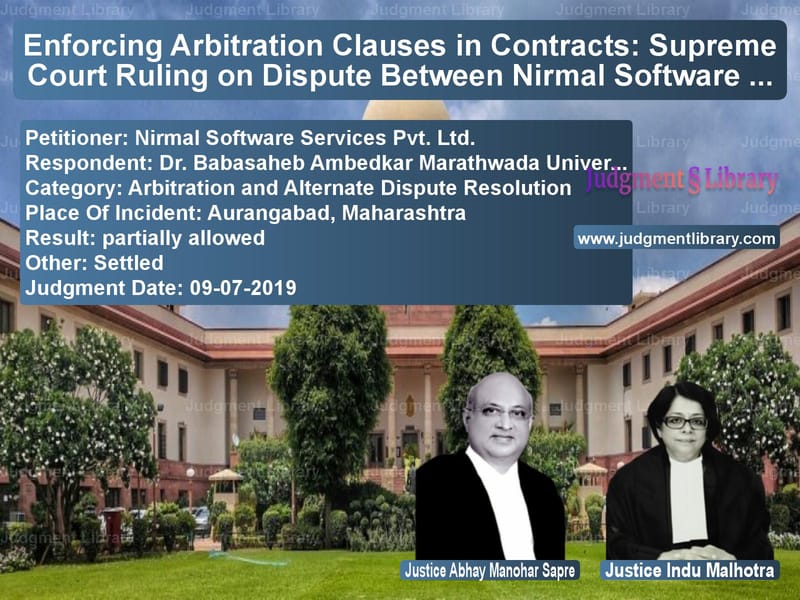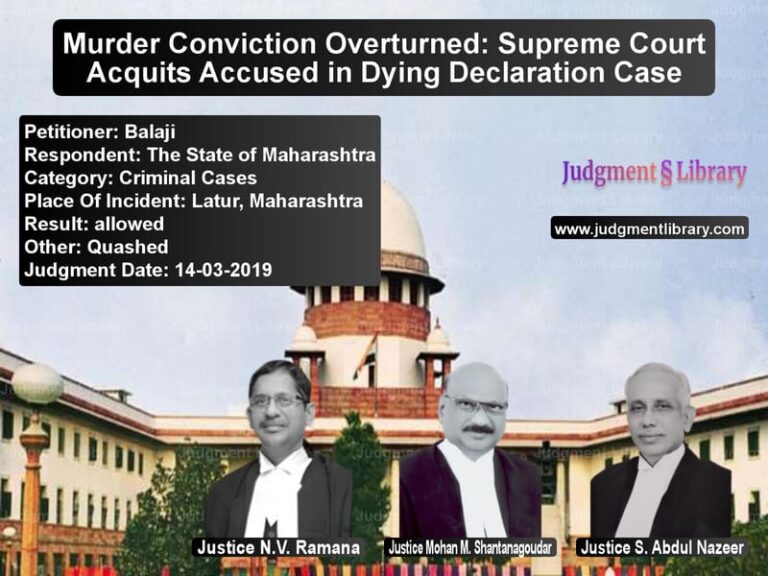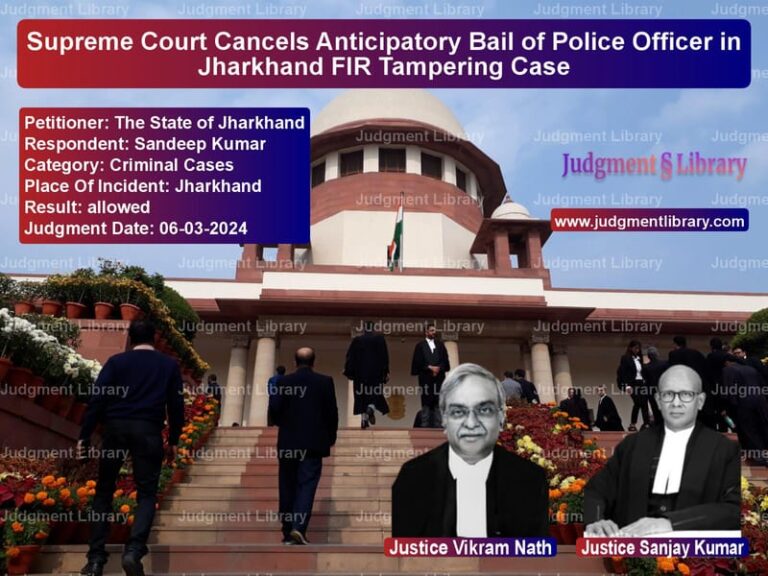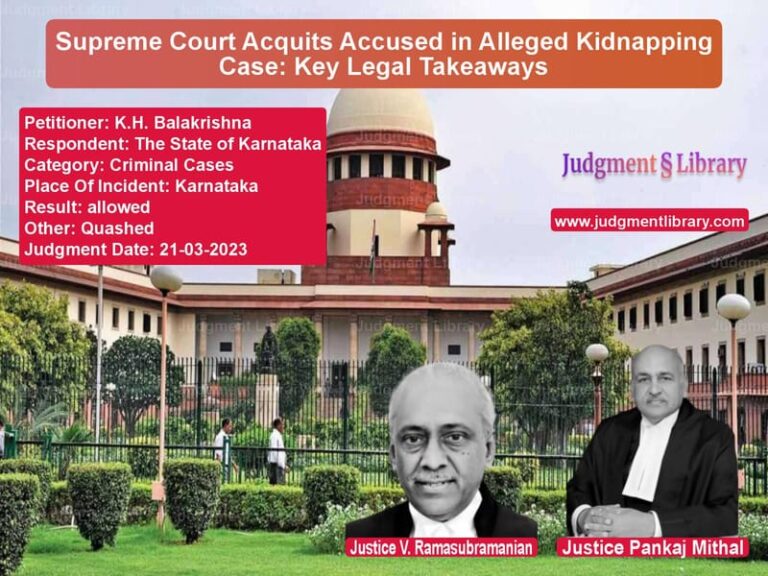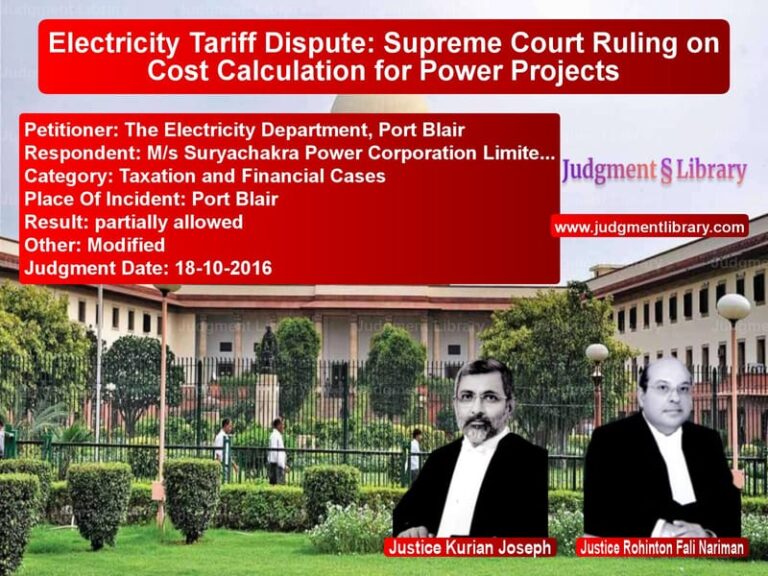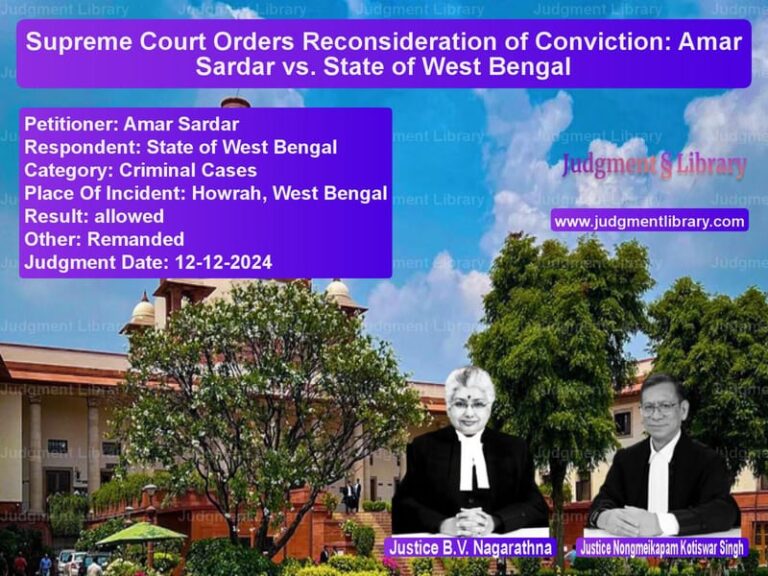Enforcing Arbitration Clauses in Contracts: Supreme Court Ruling on Dispute Between Nirmal Software and Dr. Babasaheb Ambedkar Marathwada University
The Supreme Court of India recently delivered a significant ruling in the case of Nirmal Software Services Pvt. Ltd. v. Dr. Babasaheb Ambedkar Marathwada University & Ors. The judgment revolved around the enforcement of an arbitration clause in a Memorandum of Understanding (MoU) between the parties, reaffirming the principle that courts must give precedence to arbitration agreements where they exist.
Background of the Case
On October 20, 2012, Nirmal Software Services Pvt. Ltd. (NSSPL) entered into an MoU with Dr. Babasaheb Ambedkar Marathwada University (BAMU) for ‘Web Enabling’ services. The MoU was later amended on April 7, 2016, inserting Clause 3.5, which addressed the transfer of intellectual property rights.
The MoU contained an arbitration clause, Clause 12, which stated that any disputes arising out of the agreement should first be resolved through discussions, and if unresolved, should be submitted to arbitration in Aurangabad under the Indian Arbitration & Conciliation Act, 1996.
Dispute Arises
Disputes emerged when the university issued a communication putting the purchase order in favor of NSSPL on hold. NSSPL approached the Bombay High Court, seeking a writ of mandamus to compel the university to make payments under the purchase order dated May 13, 2019, and to declare the university’s action of withholding payments as illegal.
High Court’s Decision
On September 18, 2018, the Bombay High Court dismissed the writ petition filed by NSSPL, holding that the MoU contained an arbitration clause, which should be enforced. The High Court emphasized that courts should not entertain disputes that are meant to be resolved through arbitration.
Appeal Before the Supreme Court
NSSPL challenged the High Court’s ruling before the Supreme Court via a Special Leave Petition (SLP). During the hearing, the petitioner expressed willingness to refer the dispute to arbitration, and based on this, the Court issued a notice to the respondent.
Supreme Court’s Observations and Judgment
The Supreme Court reiterated the importance of arbitration in commercial disputes and ruled:
“The presence of an arbitration clause must be given full effect. Parties that have agreed to resolve disputes through arbitration cannot bypass it and seek judicial intervention unless exceptional circumstances exist.”
Recognizing the parties’ willingness to resolve their dispute through arbitration, the Court appointed Justice Pratap Hardas (Retd.), former Judge of the Bombay High Court, as the Sole Arbitrator. The appointment was subject to the arbitrator’s declaration of independence, impartiality, and ability to complete the arbitration within 12 months.
Additionally, the Court directed that the arbitration proceedings be conducted in accordance with the Fourth Schedule of the Arbitration and Conciliation Act, 1996, as amended, and confirmed Aurangabad as the seat of arbitration.
Key Takeaways from the Judgment
- Enforceability of Arbitration Clauses: The judgment reinforced that arbitration clauses must be respected and courts should not interfere in matters where arbitration has been contractually agreed upon.
- Judicial Intervention Only in Exceptional Cases: Courts should refrain from interfering in contractual disputes unless there are exceptional circumstances warranting judicial intervention.
- Independence and Impartiality of Arbitrators: The appointment of an arbitrator must be accompanied by a declaration of independence and impartiality to ensure fair proceedings.
- Time-Bound Arbitration: The arbitrator must complete the proceedings within 12 months, preventing unnecessary delays.
Conclusion
The Supreme Court’s ruling in this case serves as an important precedent in commercial contract disputes, emphasizing the primacy of arbitration over litigation. By appointing an arbitrator and directing the parties to adhere to the arbitration process, the Court reinforced the objective of the Arbitration and Conciliation Act, 1996—to provide a faster and more efficient mechanism for dispute resolution.
Petitioner Name: Nirmal Software Services Pvt. Ltd..Respondent Name: Dr. Babasaheb Ambedkar Marathwada University & Ors..Judgment By: Justice Abhay Manohar Sapre, Justice Indu Malhotra.Place Of Incident: Aurangabad, Maharashtra.Judgment Date: 09-07-2019.
Don’t miss out on the full details! Download the complete judgment in PDF format below and gain valuable insights instantly!
Download Judgment: Nirmal Software Serv vs Dr. Babasaheb Ambedk Supreme Court of India Judgment Dated 09-07-2019.pdf
Direct Downlaod Judgment: Direct downlaod this Judgment
See all petitions in Arbitration Awards
See all petitions in Contract Disputes
See all petitions in Dispute Resolution Mechanisms
See all petitions in Institutional Arbitration
See all petitions in Enforcement of Awards
See all petitions in Judgment by Abhay Manohar Sapre
See all petitions in Judgment by Indu Malhotra
See all petitions in partially allowed
See all petitions in settled
See all petitions in supreme court of India judgments July 2019
See all petitions in 2019 judgments
See all posts in Arbitration and Alternate Dispute Resolution Category
See all allowed petitions in Arbitration and Alternate Dispute Resolution Category
See all Dismissed petitions in Arbitration and Alternate Dispute Resolution Category
See all partially allowed petitions in Arbitration and Alternate Dispute Resolution Category

